Persuasive Career Change Cover Letter
[Your Name]
[Your Address]
[City, State, ZIP Code]
[Email Address]
[Phone Number]
[Today's Date]
[Employer's Name]
[Company/Organization Name]
[Address]
[City, State, ZIP Code]
Dear [Employer's Name],
I am writing to express my keen interest in the [desired position] at [Company/Organization Name]. As a highly motivated and results-driven professional, I am eager to make a strategic career change and contribute my diverse skills and experiences to your esteemed organization.
Throughout my career in [current industry], I have achieved considerable success and growth, but I have come to realize that my true passion lies in [desired industry/field]. The opportunity to embark on a career change is not one I take lightly, and after thorough introspection, I am confident that this transition aligns perfectly with my long-term aspirations and values.
While my background may not be directly in [desired industry], my journey has equipped me with a unique set of transferrable skills and perspectives that will undoubtedly add value to your team. My experience in [mention relevant skills or achievements from your current industry] has honed my ability to [describe relevant skills such as problem-solving, communication, leadership, etc.], which I believe will be highly beneficial in the [desired position] role.
Additionally, my adaptability and willingness to embrace challenges have been evident throughout my career. I have successfully navigated through various projects and tackled new responsibilities with tenacity and a proactive approach. This has allowed me to quickly learn and excel in diverse environments, giving me confidence in my ability to thrive in a different industry.
I am deeply drawn to [Company/Organization Name]'s mission and the impact you have in the [desired industry/field]. Your commitment to [mention specific initiatives, values, or achievements] resonates with my personal values and aligns with the positive change I wish to contribute to the world. I am eager to become a part of your dynamic team and play a pivotal role in advancing your objectives.
Enclosed is my updated resume, which outlines my professional journey and accomplishments. It highlights how my skills, achievements, and passion are directly relevant to the [desired position] role at [Company/Organization Name]. I am confident that my unique blend of experiences and dedication make me a valuable candidate.
I would welcome the opportunity to discuss in greater detail how my background aligns with your organization's needs. I believe that a meeting would provide me with a chance to showcase my enthusiasm and elaborate on the specific contributions I can make to your team.
Thank you for considering my application. I am excited about the possibility of joining [Company/Organization Name] and working towards shared success. I am eager to contribute my skills and passion to make a meaningful impact.
Looking forward to the opportunity to speak with you soon. Please find my contact information above for your convenience.
Sincerely,
[Your Name]
Career Change to Marketing from Engineering
Subject: Application for Marketing Manager Position - Bringing Technical Expertise to Creative Strategy
Dear [Hiring Manager's Name],
I am writing to express my strong interest in the Marketing Manager position at [Company Name]. After five successful years as a software engineer, I have discovered my true passion lies in bridging the gap between technical innovation and customer engagement—a realization that has led me to pursue a career transition into marketing.
My engineering background has equipped me with analytical thinking, data-driven decision-making, and project management skills that translate seamlessly into marketing strategy. At [Current Company], I took the initiative to collaborate closely with our marketing team on product launches, where I learned to translate complex technical features into compelling customer benefits. This experience revealed my natural aptitude for understanding customer needs and crafting messages that resonate.
To prepare for this transition, I have completed certifications in Digital Marketing and Google Analytics, managed social media campaigns for two local nonprofits (increasing their engagement by 150%), and consistently volunteered to lead customer-facing presentations at my current role. These experiences have confirmed that marketing is where my skills and passions converge.
I am particularly drawn to [Company Name] because of your innovative approach to [specific company initiative]. My technical background would be an asset in marketing your products to both technical and non-technical audiences, and I am excited about the opportunity to bring a fresh perspective to your team.
I would welcome the opportunity to discuss how my unique combination of technical expertise and marketing passion can contribute to your team's success.
Thank you for considering my application.
Sincerely,
[Your Name]
Career Change to Healthcare from Corporate Sector
Subject: Patient Care Coordinator Application - Transitioning from Finance to Healthcare
Dear [Hiring Manager's Name],
I am writing to apply for the Patient Care Coordinator position at [Healthcare Facility]. While my resume reflects a decade in corporate finance, it does not fully capture the personal journey that has brought me to pursue a meaningful career in healthcare.
Three years ago, when my mother was diagnosed with cancer, I became her primary caregiver and advocate. Navigating the healthcare system alongside her opened my eyes to the profound impact that compassionate, organized patient coordination can have on both outcomes and quality of life. This experience transformed my perspective on what I want to achieve professionally.
My finance background has given me strong organizational skills, attention to detail, and the ability to manage complex information systems—all critical in healthcare coordination. I excel at managing multiple priorities, maintaining accurate records, and communicating clearly with diverse stakeholders. Additionally, I have completed a Healthcare Administration certificate program and volunteered 200 hours at [Local Hospital], where I gained hands-on experience with patient intake, scheduling, and medical records management.
What sets me apart is my genuine commitment to patient advocacy combined with the professional discipline I developed in the corporate world. I understand the importance of efficiency and accuracy, but I also understand that behind every chart and appointment is a person who deserves dignity, respect, and compassionate care.
I am inspired by [Healthcare Facility]'s commitment to patient-centered care and would be honored to contribute to your mission. I bring not only transferable skills but also a deep personal understanding of what patients and families need during vulnerable times.
I would appreciate the opportunity to discuss how my unique background can serve your patients and team.
With sincere regards,
[Your Name]
Career Change to Teaching from Business (Heartfelt)
Subject: High School Math Teacher Application - A Calling I Can No Longer Ignore
Dear [Principal's Name],
I am applying for the Mathematics Teacher position at [School Name], and I want to be honest with you from the start: this is not just a career change for me—it is answering a calling I have postponed for too long.
For the past eight years, I have built a successful career in business consulting, but I have always known something was missing. Every time I mentor junior colleagues, volunteer as a math tutor at the community center, or explain complex concepts to clients, I feel a spark that is absent from my daily work. That spark is the joy of teaching, and I can no longer ignore it.
I have taken concrete steps to make this transition responsibly. I completed my teaching certification while working full-time, student-taught at [School Name] for a full semester, and sought mentorship from experienced educators. I have also been tutoring high school students for three years, which has given me insight into the challenges today's students face and the patience required to guide them through difficult concepts.
What I bring to your classroom is not just passion, but also real-world experience that can make mathematics relevant to students. I can show them how algebra applies to business decisions, how statistics inform policy, and how mathematical thinking solves actual problems. My business background has also taught me project management, clear communication, and the ability to work effectively with diverse personalities—skills that translate directly into classroom management and parent engagement.
I know I am asking you to take a chance on someone without years of teaching experience, but I promise you this: no one will work harder, care more deeply, or be more committed to student success than I will be. Teaching is not my backup plan—it is my purpose.
Thank you for considering my application. I would be grateful for the opportunity to discuss how I can contribute to [School Name]'s mission.
With deep respect and enthusiasm,
[Your Name]
Career Change to Tech from Retail (Professional)
Subject: Junior Software Developer Position - Leveraging Retail Experience in Tech Innovation
Dear [Hiring Manager's Name],
I am writing to apply for the Junior Software Developer position at [Company Name]. My career transition from retail management to software development represents a deliberate and well-prepared shift toward a field where I can combine problem-solving skills with technical innovation.
Over six years in retail management, I identified recurring operational inefficiencies and often thought, "There must be a better technological solution for this." That curiosity led me to teaching myself Python, completing a full-stack development bootcamp, and building several applications that solve real retail problems—including an inventory management system that I implemented at my current store, reducing stock discrepancies by 40%.
What distinguishes my candidacy is my deep understanding of end-user needs. I have managed customer-facing operations, trained teams of 15+ employees, and resolved countless user experience issues in high-pressure environments. This perspective makes me uniquely positioned to develop software that is not just functional, but genuinely user-friendly and aligned with business objectives.
My technical skills now include JavaScript, React, Node.js, SQL, and Git version control. I have built a portfolio of five full-stack applications (available at [portfolio link]), contributed to two open-source projects, and consistently engage with the developer community through meetups and online forums.
I am particularly impressed by [Company Name]'s focus on [specific technology or product], and I believe my combination of customer service expertise and technical skills would be valuable as you develop solutions that prioritize user experience.
I would welcome the opportunity to discuss how my unconventional background can bring fresh insights to your development team.
Thank you for your consideration.
Best regards,
[Your Name]
Career Change to Nonprofit from Corporate Law
Subject: Program Director Application - Aligning Career with Personal Values
Dear [Hiring Manager's Name],
After twelve years practicing corporate law, I am ready to redirect my professional skills toward work that aligns with my deepest values. I am writing to apply for the Program Director position at [Nonprofit Organization], where I can leverage my legal expertise, project management experience, and passion for [cause] to make a tangible difference.
My decision to leave corporate law is not driven by dissatisfaction but by clarity about where I can make the most meaningful impact. While representing corporations taught me valuable skills—contract negotiation, compliance management, stakeholder coordination, and strategic planning—I have increasingly felt called to apply these abilities to advancing social good rather than maximizing profits.
My connection to [cause] is both personal and longstanding. For the past five years, I have served on the board of [Related Organization], where I have led policy development, grant writing efforts, and program evaluation initiatives. I successfully secured $150,000 in grant funding, developed our volunteer management system, and established partnerships with three municipal agencies. These experiences have given me practical nonprofit operations knowledge while confirming that this is the sector where I want to invest my career.
What I offer [Nonprofit Organization] is a unique combination: the rigor and professionalism of legal training, proven experience managing complex projects with multiple stakeholders, and genuine commitment to your mission. I understand nonprofit realities—limited resources, passionate teams, and the need for creative problem-solving—and I am prepared to work harder for less compensation because the rewards will be measured in impact rather than billable hours.
I am inspired by [Nonprofit Organization]'s innovative approach to [specific program or initiative], and I would be honored to contribute to expanding your reach and effectiveness.
I look forward to discussing how my transition from corporate law to nonprofit leadership can benefit your organization and the communities you serve.
Respectfully,
[Your Name]
Career Change to Entrepreneurship (Casual but Professional)
Subject: Partnership Opportunity - Bringing Corporate Experience to Startup Innovation
Hi [Name],
I hope this email finds you well. I wanted to reach out because I am at an exciting turning point in my career, and I think there might be an opportunity for us to work together.
After ten years climbing the corporate ladder in product management, I have made the decision to leave the safety of my corporate role and launch my own venture in [industry]. I know it sounds crazy to walk away from a six-figure salary and benefits, but I have been building toward this for two years, and I am ready to take the leap.
Here is what led me here: I kept seeing problems in [industry] that existing solutions were not addressing effectively. I built prototypes on nights and weekends, validated them with potential customers, and realized I had something worth pursuing full-time. I have bootstrapped the initial development, have three pilot customers already committed, and have built a minimal viable product that is generating interest.
What I need now is someone with your expertise in [relevant field] to help take this to the next level. I am not just bringing an idea—I am bringing a decade of product development experience, a validated business model, initial traction, and the determination to make this work.
I know entrepreneurship is not for everyone, and leaving a stable corporate job always involves risk. But I have planned carefully, have twelve months of runway saved, and have surrounded myself with mentors who have successfully made this transition. Most importantly, I wake up excited about what I am building in a way I never did in corporate life.
Would you be open to meeting for coffee to discuss potential collaboration? I would love to share more details about the business and explore whether this might interest you.
Thanks for considering this, and I hope to hear from you soon.
Cheers,
[Your Name]
Career Change to Creative Field (Graphic Design) from Accounting
Subject: Graphic Designer Position - Where Precision Meets Creativity
Dear [Hiring Manager's Name],
I am applying for the Graphic Designer position at [Company Name], bringing an unconventional background that combines the precision of accounting with the creativity of design—a combination that might seem contradictory but has proven to be my greatest strength.
For seven years, I worked as an accountant, and while I excelled at the analytical aspects of the job, I spent every spare moment pursuing design. What started as creating marketing materials for small businesses on weekends evolved into a serious passion backed by professional training. I completed a graphic design certificate, built a diverse portfolio of client work, and eventually took on freelance design projects that generated enough income to make this career change financially viable.
What makes my accounting background an asset rather than a liability is the discipline it instilled. I understand deadlines, client expectations, budget constraints, and the importance of delivering exactly what was promised. I approach design projects with the same attention to detail and organizational rigor that I applied to financial statements, but now I channel that precision into visual communication.
My portfolio (available at [portfolio link]) demonstrates proficiency in Adobe Creative Suite, brand identity development, digital and print design, and user interface design. Recent projects include rebranding for [Client Name], which increased their customer inquiries by 60%, and designing the complete visual identity for a tech startup that successfully raised seed funding.
I am particularly drawn to [Company Name] because your work balances aesthetic innovation with strategic communication—exactly the intersection where my skills shine. I bring not just design capabilities but also the client management experience and business acumen that comes from years in professional services.
I would love the opportunity to discuss how my unique background can contribute to your creative team.
Thank you for your consideration.
Creatively yours,
[Your Name]
What is a Persuasive Career Change Cover Letter and Why Do You Need One
A persuasive career change cover letter is a strategic document that explains and justifies your transition from one professional field to another. Unlike traditional cover letters that emphasize linear career progression, this letter addresses the elephant in the room—your lack of direct experience—while reframing your background as an advantage rather than a liability.
Why you need one:
- Your resume alone cannot explain the logic behind your career pivot
- Hiring managers are naturally skeptical of career changers and need reassurance
- You must proactively address concerns about commitment, motivation, and transferable skills
- It demonstrates self-awareness and intentionality rather than desperation
- It provides context for gaps in traditional qualifications
- It allows you to control the narrative before interviews
- It shows you have thoroughly considered this decision and are not simply fleeing a bad situation
When Should You Write a Career Change Cover Letter
Triggering situations:
- Applying for positions in an industry where you have no direct experience
- Transitioning from corporate to nonprofit sector or vice versa
- Moving from technical roles to creative roles or vice versa
- Changing from employee to entrepreneur or consultant
- Shifting from one professional field to a completely different one (e.g., law to teaching)
- Returning to workforce after extended break with new career focus
- Following a personal revelation or life event that changed your priorities
- After completing retraining, certification, or education in a new field
- When your recent work history does not align with the position you are seeking
- Pursuing a long-held passion that your previous career did not accommodate
- Seeking to leverage transferable skills in a completely different context
When it is essential rather than optional:
- The job posting explicitly asks for experience you do not have
- Your most recent job title bears no resemblance to the position
- You are making a dramatic salary adjustment (up or down)
- You are transitioning into a highly competitive or specialized field
Elements and Structure of a Career Change Cover Letter
Essential components:
- Subject line (for emails): Clear, specific, and mentions the position
- Opening statement: Directly acknowledge you are changing careers—do not hide it
- Motivation explanation: Why you are making this change (personal, professional, or both)
- Transferable skills section: Specific abilities from previous career that apply to new field
- Preparation evidence: Concrete steps you have taken to prepare for transition
- Relevant accomplishments: Achievements from previous career that demonstrate capability
- Industry knowledge: Proof you understand the new field and are not naive about it
- Company-specific connection: Why this particular organization attracts you
- Value proposition: What unique perspective or advantage your background provides
- Closing with confidence: Request for interview without apologizing for your background
What to attach:
- Updated resume tailored to emphasize transferable skills
- Portfolio of work (if applicable to new field)
- Certifications or training credentials
- Letters of recommendation from mentors in new field
- Examples of relevant projects or volunteer work
How to Write a Persuasive Career Change Cover Letter
Step-by-step process:
- Research thoroughly: Understand the target industry, company culture, required skills, and common career paths
- Identify transferable skills: Map your previous experience to new role requirements
- Craft your narrative: Develop a compelling story about why you are changing and why now
- Gather evidence: Collect specific examples and metrics from your background
- Address concerns preemptively: Anticipate skepticism and counter it directly
- Emphasize preparation: Detail training, certifications, volunteer work, or side projects
- Show enthusiasm authentically: Express genuine passion without sounding desperate
- Customize completely: Never use generic templates—tailor every letter to specific job
- Get feedback: Have someone in the target industry review your letter
- Revise for clarity: Ensure your reasoning is logical and easy to follow
- Proofread meticulously: Errors are more damaging when you are already asking for a chance
Thought process:
- Think like a hiring manager: What would make you take a risk on someone without direct experience?
- Focus on what you bring TO the role, not just why you want OUT of your current career
- Balance confidence with humility—you are capable but willing to learn
- Consider what makes you memorable compared to traditional candidates
Who Should Write a Career Change Cover Letter
This letter should appear to come from:
- Professionals making deliberate, well-planned career transitions
- Individuals who have taken concrete steps to prepare for the new field
- People whose previous experience adds unique value to the new role
- Career changers who can articulate clear, logical reasons for the shift
- Those who have realistic expectations about starting at appropriate levels
- Individuals with demonstrated passion through volunteer work, side projects, or training
- People willing to accept potential pay cuts or position level adjustments
Who might not need this letter:
- Those making lateral moves within the same industry
- People promoted into different roles within the same company
- Individuals with direct experience gained through extensive volunteering
- Those whose previous role naturally leads to the new one
To Whom Should You Address Career Change Cover Letters
Primary recipients:
- Hiring managers directly responsible for the open position
- HR recruiters who screen applications before forwarding to hiring managers
- Department heads who have final approval authority
- Small business owners who handle all hiring decisions
- Startup founders who value unconventional backgrounds
How to address them:
- Research to find specific names—never use "To Whom It May Concern"
- Use LinkedIn, company websites, or phone calls to identify the right person
- If name is unknown, use title: "Dear Hiring Manager" or "Dear [Department] Team"
- For networking referrals, mention the connection in the opening line
- When applying through recruitment agencies, address both agency and end employer
Special considerations:
- If company values innovation, address to someone who champions change
- For conservative industries, ensure recipient appreciates transferable skills
- When referred by current employee, address to that person's supervisor
Requirements and Prerequisites Before Writing Your Letter
Preparation checklist:
- Complete relevant training, certifications, or coursework in new field
- Gain hands-on experience through volunteering, internships, or side projects
- Build a portfolio or work samples demonstrating new skills
- Network with professionals in target industry for insights and advice
- Research target companies thoroughly—culture, values, recent news
- Update LinkedIn profile to reflect transition and new skills
- Prepare 3-5 specific examples of transferable skills with metrics
- Identify your unique value proposition—what makes you different from traditional candidates
- Develop clear, honest narrative about why you are changing careers
- Ensure you have realistic salary expectations for entry into new field
- Confirm you can afford potential temporary income reduction
- Secure references who can speak to your transferable skills
- Address any resume gaps or concerns before writing letter
Conditions that must be met:
- You have genuine interest in the field, not just desperation to leave current job
- You understand entry-level expectations and are willing to start appropriately
- You have done enough research to speak knowledgeably about the industry
- Your skills genuinely transfer—not just in your imagination
- You are prepared to answer difficult interview questions about your transition
Formatting Guidelines for Career Change Cover Letters
Length specifications:
- Keep to one page maximum—approximately 300-400 words
- Three to four paragraphs is ideal structure
- Each paragraph should be 4-6 sentences
- Shorter is better if you can convey necessary information concisely
Tone and style preferences:
- Professional but authentic—avoid corporate jargon that sounds rehearsed
- Confident without arrogance—you have valuable skills but respect the learning curve
- Enthusiastic without desperation—show passion but not neediness
- Honest about transition while remaining positive about previous experience
- Direct about career change—do not try to hide it or be vague
Wording considerations:
- Avoid apologetic language: "I know I lack experience, but..."
- Use action verbs that demonstrate agency: "I pursued," "I developed," "I created"
- Frame previous career as asset: "My background in X provides unique perspective on Y"
- Be specific with numbers and achievements—vague claims lack credibility
- Avoid clichés: "thinking outside the box," "hit the ground running"
- Use industry-appropriate terminology to show you understand the field
Mode of sending:
- Email is appropriate for most modern applications unless specifically instructed otherwise
- PDF format ensures formatting remains consistent across devices
- Include letter in email body AND attach as PDF
- Use professional email address—firstname.lastname format
- Subject line should be clear: "Application for [Position] - [Your Name]"
- For highly formal industries (law, finance), consider traditional letter format
Etiquette essentials:
- Send during business hours on weekdays
- Follow any specific application instructions precisely
- Respond promptly to any follow-up communications
- If applying to multiple positions at same company, acknowledge this tactfully
What to Do After Sending Your Career Change Cover Letter
Immediate follow-up actions:
- Note the date sent in your application tracking system
- Save a copy of the exact letter and resume you submitted
- Connect with hiring manager on LinkedIn if you have not already (but do not message yet)
- Set a reminder for one week follow-up if you hear nothing
- Continue applying to other positions—never pin hopes on one application
One week after sending:
- Send a brief, polite email checking on application status
- Reiterate your interest and mention one additional relevant qualification
- Keep this follow-up to 3-4 sentences maximum
If you receive an interview request:
- Respond within 24 hours expressing enthusiasm
- Prepare thoroughly for questions about career change motivation
- Develop specific stories that illustrate transferable skills
- Research company extensively—you must know more than traditional candidates
- Prepare thoughtful questions about company culture and onboarding process
If you receive a rejection:
- Send a gracious thank-you note
- Politely ask for feedback on your application (many will not respond, but some will)
- Request to be considered for future openings
- Stay connected on LinkedIn—you never know what future opportunities arise
If you hear nothing after two weeks:
- Send one final follow-up email
- If still no response, move on but keep the company on your radar
- Apply again in 6-12 months if a suitable position opens
Timeline expectations:
- Career changers should expect longer response times than traditional candidates
- Do not be discouraged by silence—your application requires more consideration
- Continue improving your skills and building your portfolio while waiting
- Plan for a 3-6 month job search timeline, possibly longer
Advantages and Disadvantages of Career Change Cover Letters
Advantages:
- Allows you to control the narrative before objections arise
- Demonstrates self-awareness and emotional intelligence
- Provides context that a resume alone cannot convey
- Shows initiative and serious commitment to transition
- Helps you stand out from traditional candidates who may have generic applications
- Enables you to reframe perceived weaknesses as unique strengths
- Demonstrates communication skills—critical for most professional roles
- Gives you opportunity to explain non-obvious connections between careers
- Shows respect for employer's time by addressing obvious questions upfront
- Can trigger positive bias if reader values diversity of perspective
Disadvantages:
- Draws explicit attention to your lack of direct experience
- May be immediately rejected by applicant tracking systems
- Requires more time and customization than standard cover letters
- Risk of over-explaining or sounding defensive
- May not overcome strong preference for traditional candidates
- Could be seen as risky hire compared to "safe" choices
- Might raise questions about commitment if narrative is not convincing
- Can backfire if reasoning seems naive or poorly thought out
- May result in lower salary offers due to "entry-level" positioning
- Some hiring managers simply will not read cover letters at all
Comparison: Career Change Cover Letter vs. Traditional Cover Letter
Key differences:
- Traditional: Emphasizes linear career progression | Career change: Explains intentional disruption of progression
- Traditional: Highlights directly relevant experience | Career change: Translates transferable skills across contexts
- Traditional: Brief or no explanation of motivation | Career change: Detailed narrative about why transition makes sense
- Traditional: Focuses on past achievements in same field | Career change: Emphasizes preparation for new field
- Traditional: Often follows templates with minor customization | Career change: Requires complete customization to address concerns
- Traditional: Can be shorter and more formulaic | Career change: Must be longer and tell compelling story
When to use career change letter instead of traditional:
- Your resume will immediately raise questions about fit
- You lack the standard credentials or experience path
- You need to explain a dramatic shift in focus
- The job posting specifically requires experience you lack
Alternative approaches:
- Networking referral: Get introduced through mutual connection who can vouch for you
- Portfolio first: Lead with strong work samples before traditional application
- Informational interviews: Build relationships before formally applying
- Internal transfer: If possible, move into new role within current organization
- Temp or contract work: Prove yourself through short-term project before seeking permanent role
- Skills-based application: Some companies use skills assessments instead of traditional applications
Best Practices and Expert Tips for Career Change Cover Letters
Advanced strategies:
- Open with a hook that immediately addresses the career change positively
- Use the "bridge technique": explicitly connect old career skills to new career needs
- Include a brief "why now" explanation—timing matters and shows planning
- Mention specific company initiatives that align with your new career goals
- Use metrics from previous career to demonstrate high performance
- Reference industry leaders or influences that inspired your transition
- Include tactical details about your preparation to show seriousness
- Create a "unique value proposition" statement that only you can claim
- Use storytelling techniques—humans respond to narrative more than bullet points
Insider secrets:
- Many career changers get hired because they bring fresh perspectives, not despite their different background
- Hiring managers often admire the courage to change careers—use this to your advantage
- Companies facing disruption often value unconventional backgrounds more than traditional ones
- Your lack of industry-specific habits can be advantage—you are not stuck in old ways
- Decision-makers who made career changes themselves are often sympathetic
Efficiency shortcuts:
- Create a "master" career change cover letter with your core narrative, then customize the company-specific paragraphs
- Develop 5-7 "transferable skill" stories you can mix and match based on job requirements
- Build templates for different scenarios (corporate to nonprofit, technical to creative, etc.)
- Keep a "wins" document tracking achievements with metrics for easy reference
- Use AI tools to help identify transferable skills you might overlook, but never use AI-generated text without heavy editing
Common Mistakes to Avoid in Career Change Cover Letters
Fatal errors:
- Apologizing for your background or sounding defensive about the change
- Focusing on what you want from the career change rather than what you offer
- Being vague about why you are changing careers—specificity builds credibility
- Claiming you have "always" wanted this career when your resume proves otherwise
- Exaggerating preparation or claiming expertise you do not have
- Badmouthing previous career, employer, or industry
- Writing a generic letter that could apply to any job in the new field
- Failing to research the company and including irrelevant information
- Making the letter about your personal journey rather than employer's needs
- Using desperate language: "I'll do anything," "Just give me a chance"
Subtle mistakes that undermine credibility:
- Overusing qualifiers: "I think," "I believe," "I hope"
- Including irrelevant details from previous career that do not transfer
- Writing too long—going over one page signals poor judgment
- Trying to hide the career change with vague language
- Focusing on what you are "learning" rather than what you already "know"
- Neglecting to explain HOW your skills transfer—assuming it is obvious
- Using jargon from your old field that new field will not understand
- Failing to address obvious concerns like salary expectations or willingness to start at lower level
- Making promises you cannot keep about immediate impact
- Treating the letter as therapy session about your dissatisfaction rather than professional document
Technical mistakes:
- Typos and grammatical errors (especially damaging when asking for a chance)
- Inconsistencies between cover letter and resume
- Wrong company name or hiring manager name (copy-paste errors)
- Unprofessional email address
- Forgetting to attach resume or mentioned portfolio
- Sending from wrong email account (personal vs. professional)
Frequently Asked Questions About Career Change Cover Letters
Should I mention that I am willing to take a pay cut? Generally no—do not volunteer this information in cover letter. Address in negotiation phase if asked directly. However, if applying for positions clearly below your previous level, brief acknowledgment that you understand role expectations can be appropriate.
How do I explain a career change without sounding like I am running away from something? Frame it as moving TOWARD something compelling rather than AWAY from something negative. Focus on attraction to new field, not dissatisfaction with old one. Use positive language about what previous career taught you.
What if I do not have formal training in the new field yet? Emphasize self-directed learning, online courses, workshops, or practical experience gained through volunteering or side projects. Demonstrate commitment through concrete actions even without formal credentials.
Should I explain my entire career history or just recent experience? Focus on most recent 5-10 years unless earlier experience is uniquely relevant. Career change letters should be concise—include only what directly supports your transition narrative.
How honest should I be about my motivations? Be genuine but strategic. "I want better work-life balance" is honest but not compelling to employer. "I want to apply my skills to mission-driven work" is both honest and appealing.
What if I am changing careers because I was laid off? Do not lead with this information. Focus on positive reasons for new direction. If asked directly, be honest but frame positively: "The layoff gave me opportunity to pursue something I had been considering."
Can I use the same cover letter for multiple applications? Never. Each letter must be substantially customized to specific company and role. Hiring managers can instantly spot generic letters and will dismiss them.
How do I address age concerns in career change letter? Do not mention age unless specifically relevant. Focus on energy, adaptability, and fresh perspective. Let your preparation and enthusiasm speak to your commitment regardless of age.
Should I mention that I am making this change for family reasons? Only if it directly relates to your qualifications or timing. "I relocated to this city to be near family and am excited to contribute to local [industry]" is fine. Detailed personal circumstances are unnecessary.
What if I am changing careers multiple times? This is challenging and requires careful narrative construction. Frame yourself as someone with diverse experience who has now found the right fit, backed by concrete evidence of commitment to current direction.

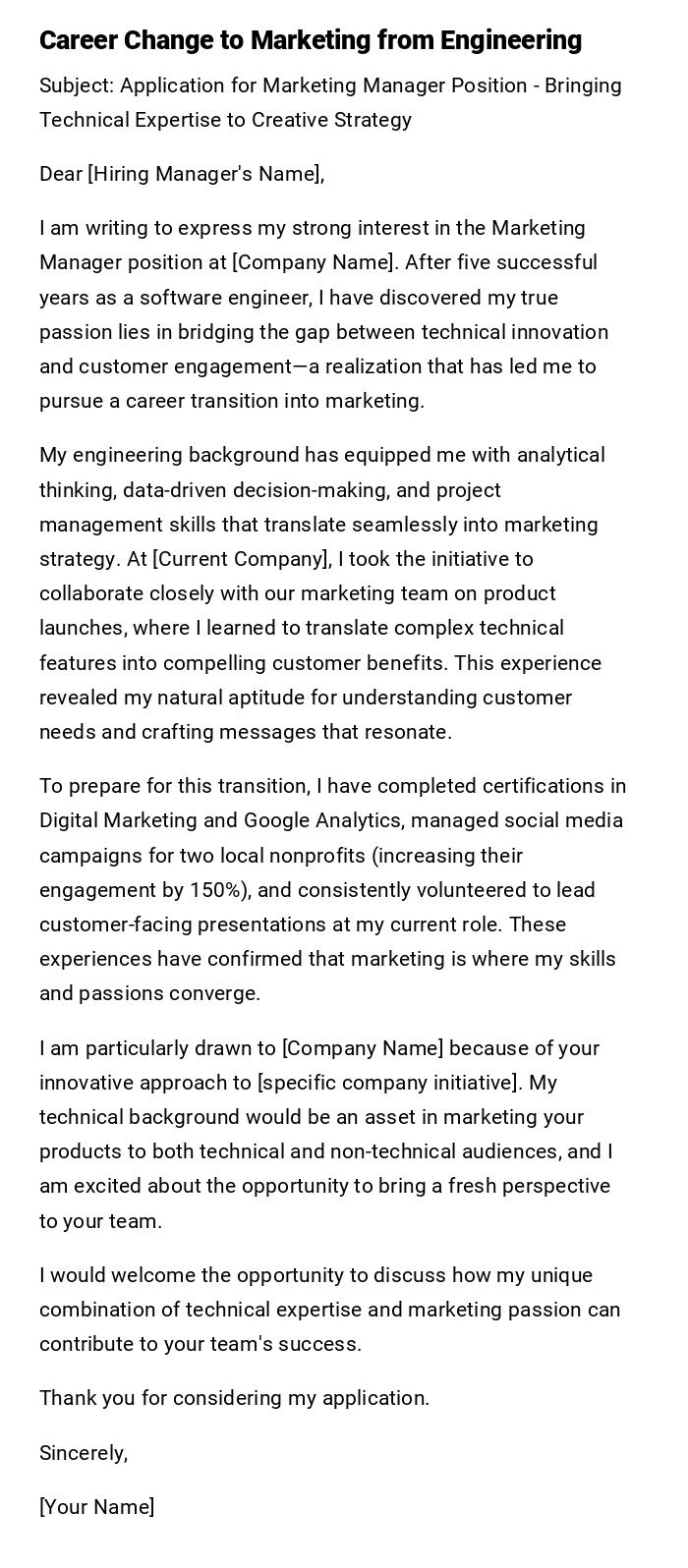
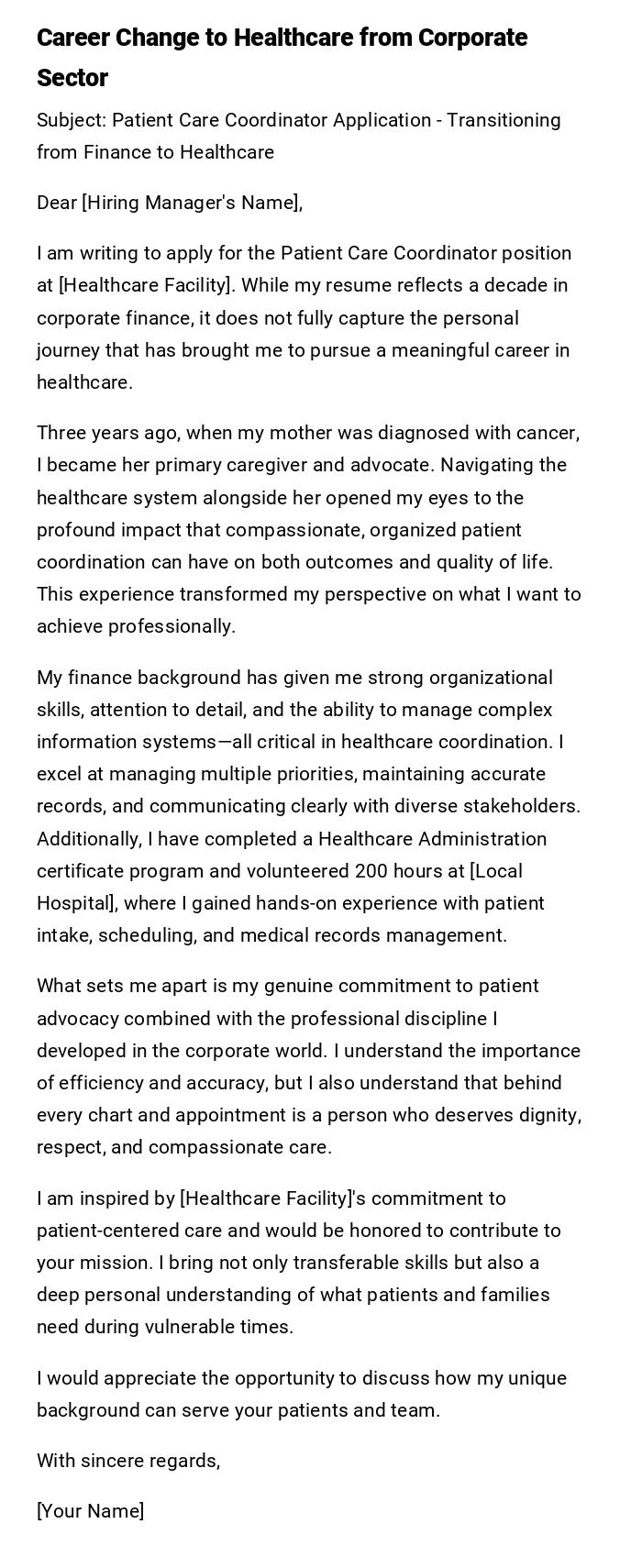
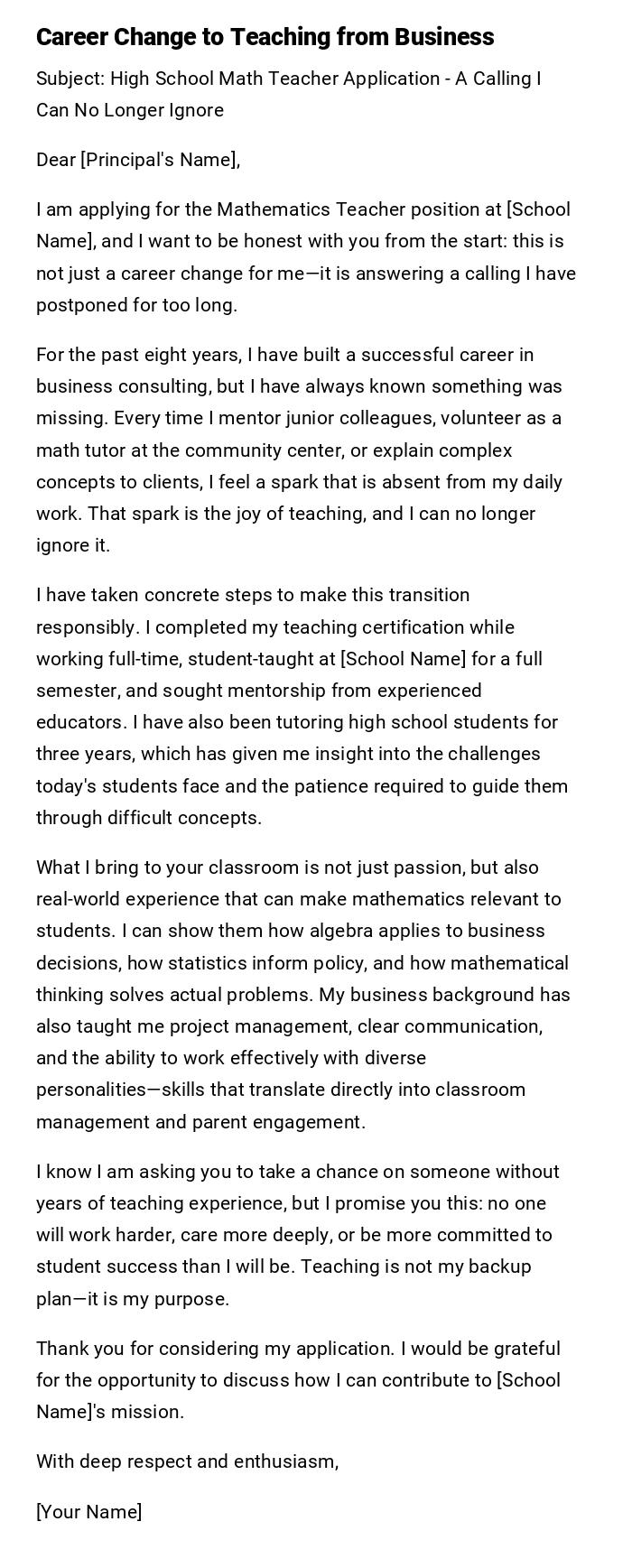
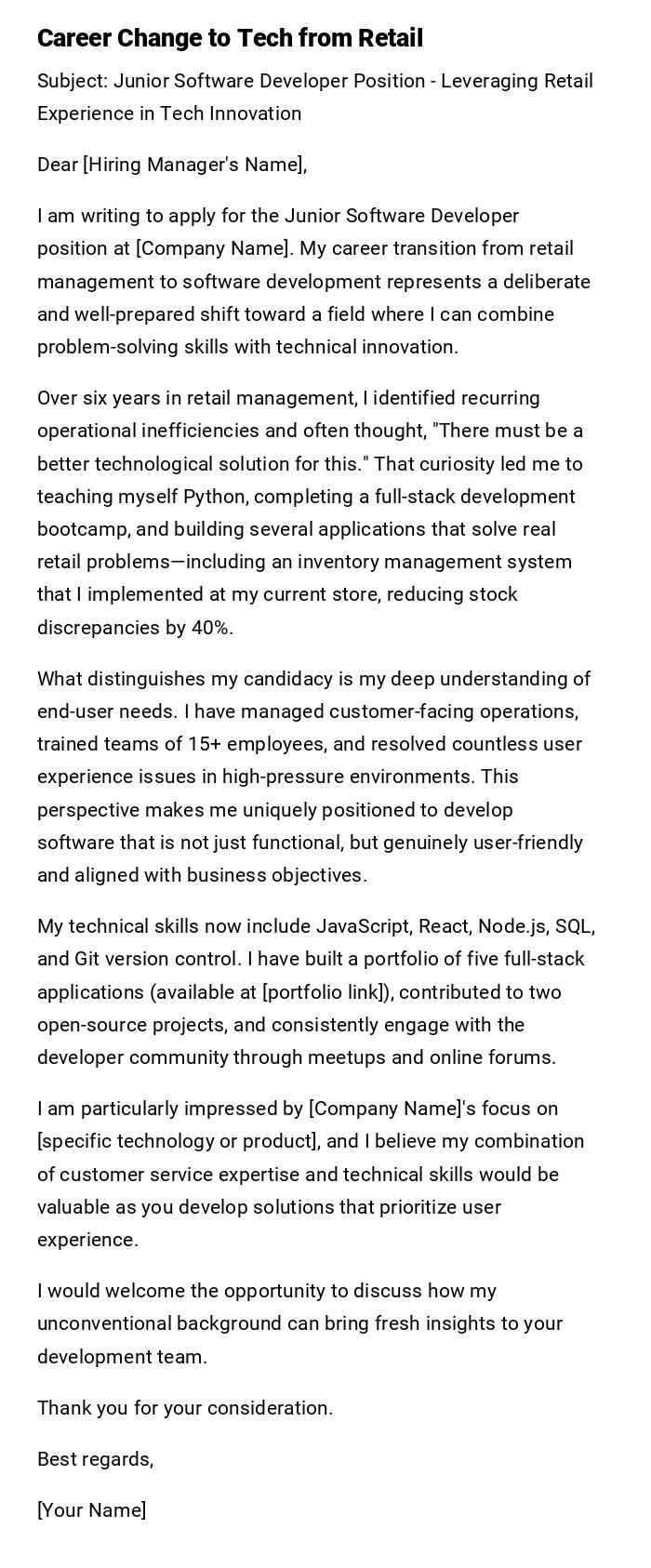
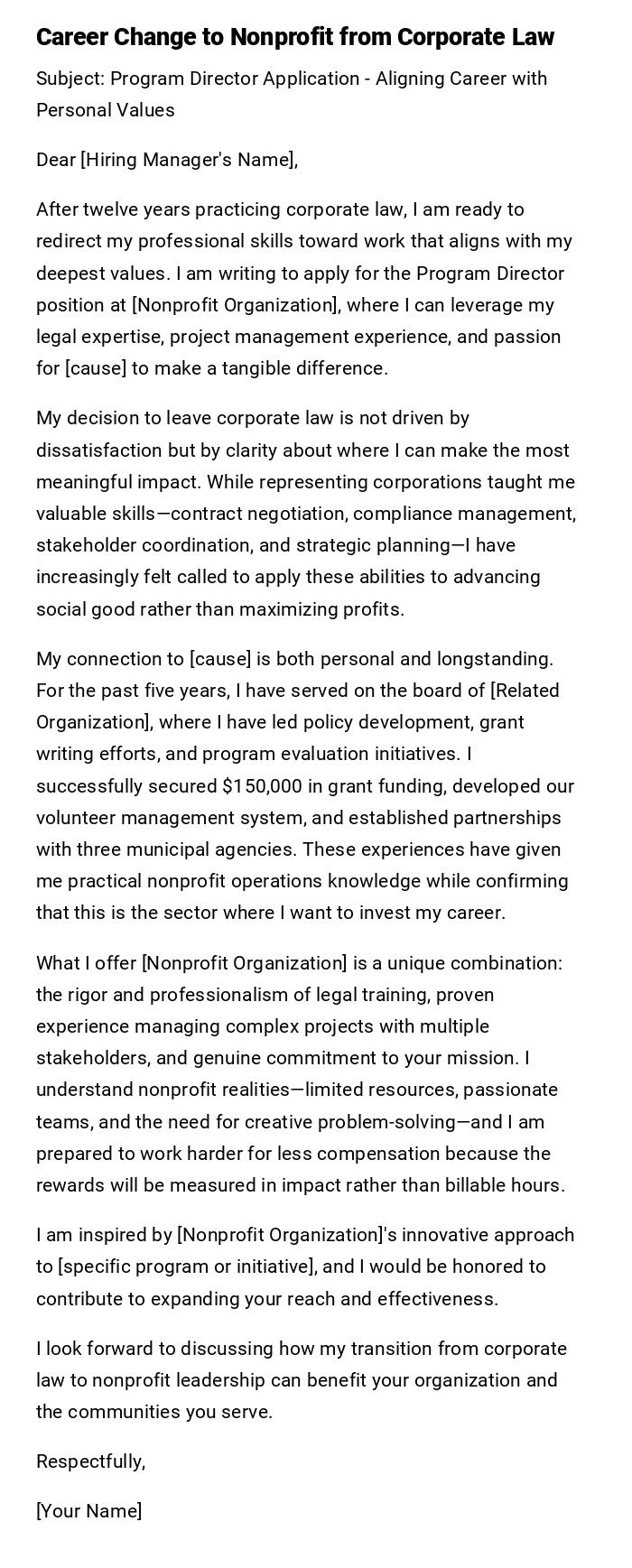
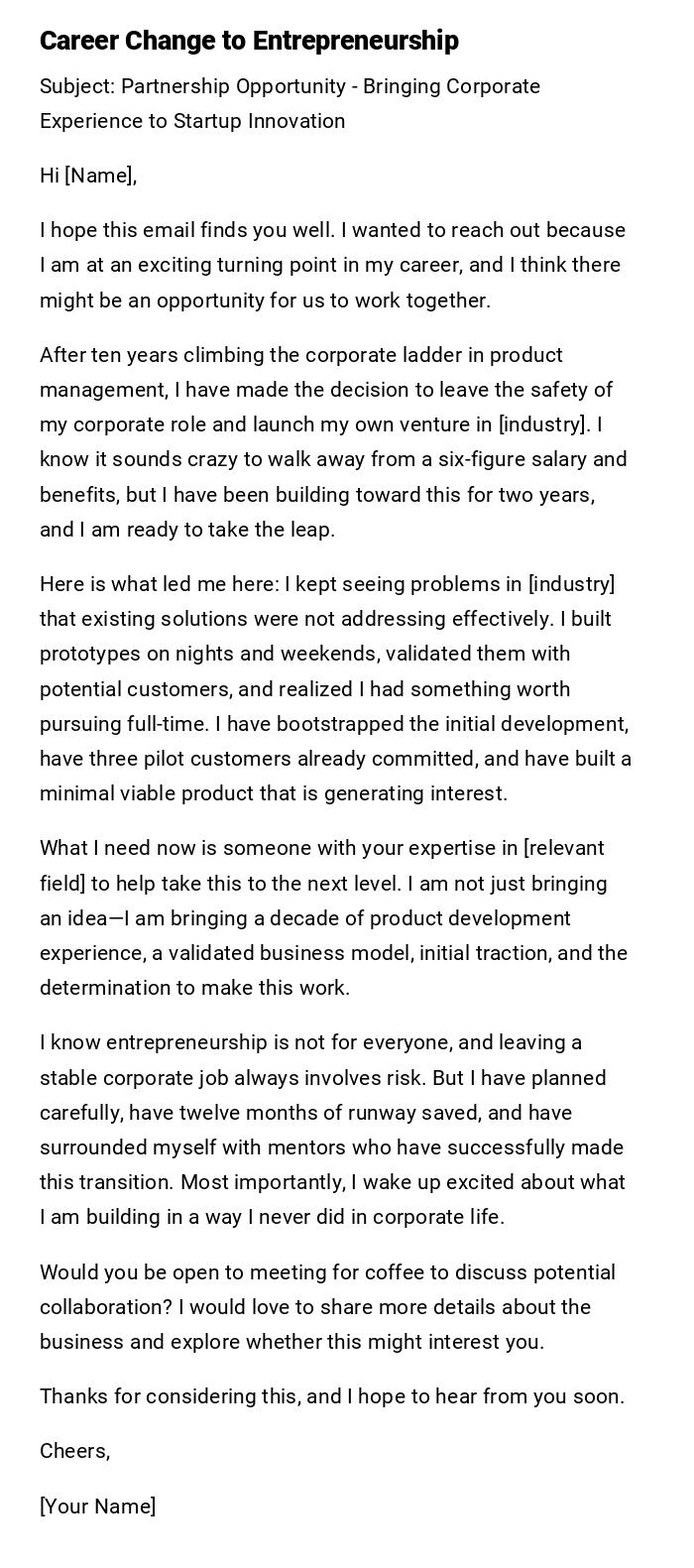
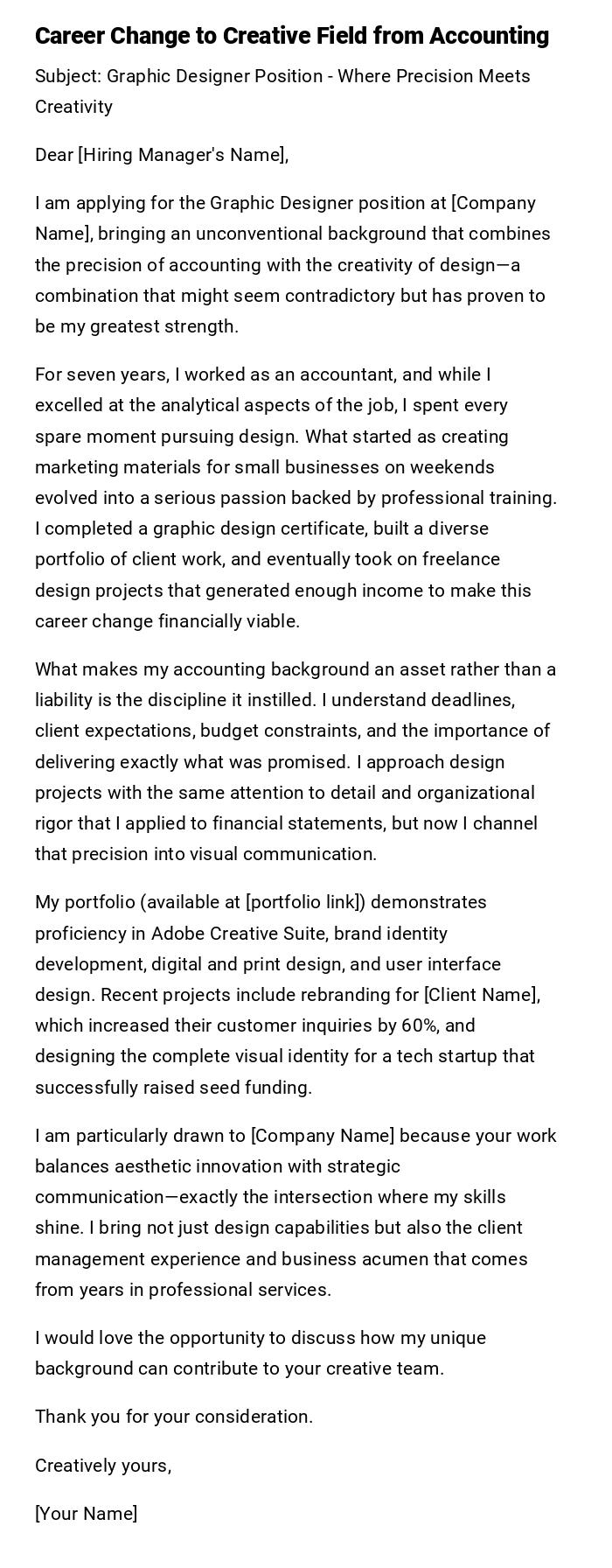

 Download Word Doc
Download Word Doc
 Download PDF
Download PDF